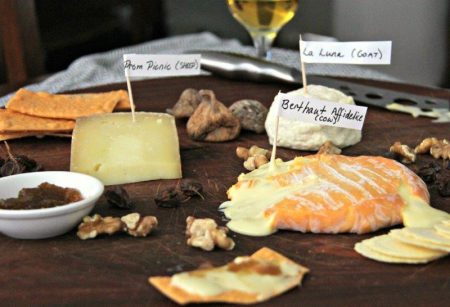 Wine and cheese are a fantastic combination. Good for an appetizer, an alternative to dessert, as part of a grazing platter or an excellent addition to a dinner party. How do you make a gourmet cheese platter? Are there any guidelines? What about wines? What goes with what? A good combination of cheese and wine can delight all of the senses.
Wine and cheese are a fantastic combination. Good for an appetizer, an alternative to dessert, as part of a grazing platter or an excellent addition to a dinner party. How do you make a gourmet cheese platter? Are there any guidelines? What about wines? What goes with what? A good combination of cheese and wine can delight all of the senses.
Australia produces some excellent wines and cheeses. Victoria, the state in which Melbourne is located, is the heart of Australia’s dairy production and has some well-regarded artisan producers. Unfortunately you do not find a lot of Australian cheese overseas as most high-quality cheese makers tend to produce quantities which are too small to support large export markets.
It’s no secret that Australia has a thriving wine industry. States Victoria, New South Wales, South Australia, Western Australia and Tasmania all have major wine industries. So there is no shortage of good table wine (red or white) or a fortified (port, muscat, tokay, or a “sticky white”) to accompany your cheese platter. More on that below.
Today, we provide some pointers on how to put together a good cheese platter that will enliven all of the senses.
Australian and Victorian Cheeses
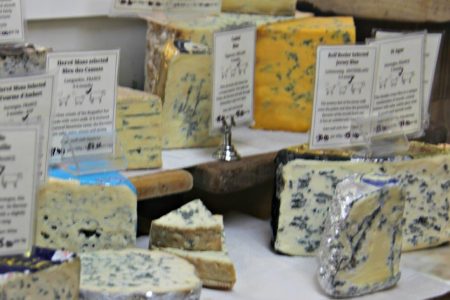
One producer you might find overseas (large producers for Australia) is Tasmania’s King Island Dairy. They regularly feature in the Australian Grand Dairy Awards and make excellent soft cheeses including camembert, brie and soft blue varieties. (Their cream is also excellent.) Other well known producers include Bruny Island Cheese (Tasmania), Holy Goat! (artisan goat cheeses from Victoria), and Meredith Dairy (beautiful goat and sheep cheeses and yogurts from Victoria. Their marinated feta is divine).
We love Holy Goat! And they are a regular at local farmer’s markets in Victoria. We see them monthly at the Collingwood Children’s Farm Market where they have been a stall holder for years. You can find reference to our preference for Meredith Dairy’s feta in our recent Avocado Smash Recipe.
As Australia does not export large volumes of cheese it is a great thing to try while you are here. There are some great cheese shops in Melbourne and a lot of restaurants will offer a high quality selection of local and/or imported cheeses. Two of our favorites are:
- The Richmond Hill Cafe and Larder. You can read more about it in our 11 of Melbourne’s Best Food Shops and Cooking Classes
- And the Spring Street Grocer in the Melbourne CBD.
The scent of maturing cheeses when you walk into these cheese rooms is like being hit by a wall of magnificence.
We love cheese and everything about cheese. We have attended workshops in Melbourne to learn how to make cheese. We have visited a dairy producing Parmigiano Reggiano in Parma, Italy (the home to this fantastic cheese) as well as many dairies in Australia. We work cheese into our travels and our meals, making sure we try the local products whenever we can.
How to Construct a Cheese Platter
How many people are you feeding? You should allow about 1-2 ozs (30-60 grams) per person per cheese. Going with an odd number of cheeses is visually more appealing than even numbers (1, 3 or 5 cheeses).
There is nothing wrong with having one cheese only, especially if it is a large ripe cheese that “runs”. There is nothing worse than trying to re-pack half-used ripe cheeses. You are better off having 1 cheese that is fully consumed rather than 3 less than half eaten left over cheeses.
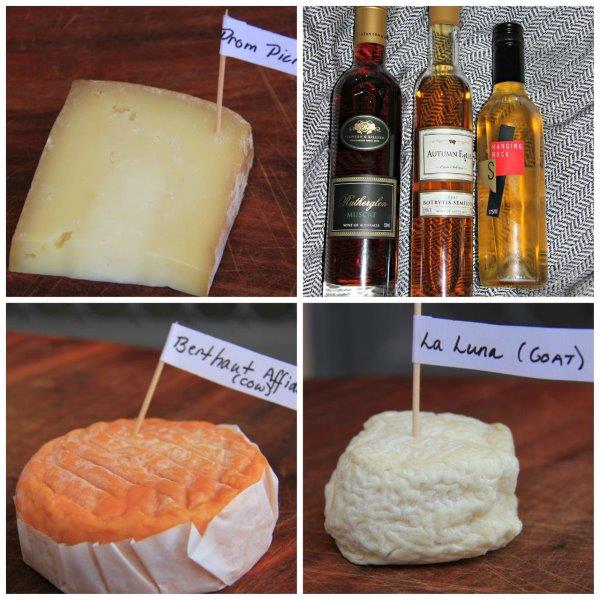
What varieties are you going to choose? Soft? How about a brie or a camembert? Hard? How about a great cheddar? Semi-soft? How about a gruyere or havarti? Are you going to serve a blue? If it is the only cheese on your platter be careful as not everyone cares for it. Care for an alpine cheese? Very popular and quite common in Europe. Washed rind and ash rind cheeses are becoming very popular, look out for them.
What type of milk? Cow? Goat? Sheep? We still eat cow’s cheese but prefer sheep and goat varieties.
If you are looking at more than 1 cheese then make sure you have a variety of textures, flavors and milk types in case some people have allergies, especially towards cow’s milk cheeses.
Some general guidelines for a great cheese platter:
- Select different textures of cheese- soft, semi hard, hard, blue
- And/or select different animals: cow, goat, sheep
- Or pick a region and select a mix of cheese from that area, i.e Australia, Spain, France
- Try to include at least one cheese that will appeal to most people- mild taste
The cheeses in our platter are:
- Berthoud Affidelice (French – Burgundy – goes well with a Chablis or chardonnay)
- Holy Goat! La Luna (Castlemaine, in the rolling hills of Central Victoria – goes well with riesling or chardonnay)
- Prom Country Cheese Prom Picnic (Bena near stunning Wilson’s Promontory, Victoria – goes well with chianti)
Accompaniments for a Cheese Platter
You don’t need to go overboard with accompaniments if you are serving 1 cheese. But if you are serving more than 1, I think multiple accompaniments look attractive on the platter.
Are you going to provide crackers or bread? A beautiful, traditionally-made sour dough is a great all round choice. Also consider a nut bread or nut/fruit combination loaf. And the availability of high quality, mild-tasting crackers is exploding. Try water crackers or lavosh. Are you catering for gluten-intolerant people? It is more common than you think! Luckily the selection of gluten-free crackers is improving.
Are you serving the platter as an appetizer? Try olives, cured meats and fruit like pear and apple. Here is another Italian-style antipasto platter, incorporating Parmigiano Reggiano.
If the platter is being served after the main meal, then I would go for nuts (walnuts are perfect), dried fruit like figs, apricot, sultanas and dates. Fresh fruit is also good. Also consider quince paste (a highlight with soft cheeses) or fig loaf for something different. You can also try something luscious to dip into like honey or balsamic vinegar (both brilliant with strong, hard cheeses like cheddar or Parmigiano Reggiano).
We like to serve our cheese platters on a wooden board, as the cheeses look good on them and there is plenty of room for the accompaniments. Arrange your cheeses on the board first and then scatter your accompaniments in and around them. Marble, slate or a large plate are also good for serving cheese.
I like to provide a separate knife for each cheese. And I like to label the cheeses so that people know what they are eating and it provides a good talking point.
Wines to Accompany your Gourmet Cheese Platter
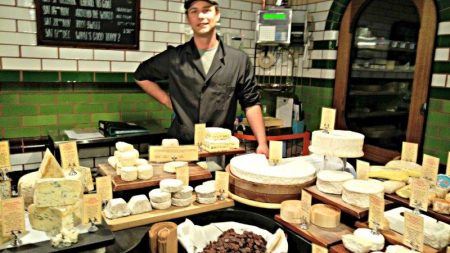
There are no rules when it comes to wines to accompany cheese. Having table wines are more than acceptable. Pinot Noir is great with sheep’s milk cheeses (soft, nutty taste) but not so good with strong blue cheeses. Strong cheeses like cheddar go well with strong reds like cabernet sauvignon. White table wines like chardonnay can work well with brie.
If you are serving 1 cheese only, use a search engine to check recommendations for a wine accompaniment.
If you are serving the cheese platter after the meal, as is the custom in Australia, dessert or fortified wines (sweeter and generally of higher alcohol content) are another great choice. In Australia, port was the choice of most people in the 1970’s and then we discovered muscat and tokay. Rutherglen in Victoria is a famous region for port, muscat and tokay. They are all great choices for a cheese platter. “Sticky whites” (late harvest reisling, botrytis semillon, and others) have become incredibly popular in Melbourne and they are a great all-round choice.
Port, muscat or sticky whites are my preference (especially if there is more than 1 cheese on your platter).
The nearby picture features 2 of our favorites being:
- Stanton & Killeen Muscat (any port, muscat or tokay from the Rutherglen area will be excellent)
- Hanging Rock “S” Dessert Riesling (a sticky white produced not far from Melbourne in the Strathbogie Ranges area)
The third wine pictured is Autumn Falls Botrytis Semillon (from New South Wales).
Storing your Leftover Cheese
If you have bought your cheese from a specialty cheese shop, the cheese will have been wrapped in made for purpose cheese paper. Re-wrap the cheeses in these. Otherwise use waxed paper. Once the cheese has been wrapped, you can either store in the dairy container of your refrigerator or set on a plate and cover with plastic wrap (yes 2 wraps in this case).
Experiment and Have Fun
If you are struggling with exactly what to buy my advice is to go to your local, specialty cheese shop and ask. People who work in these businesses are passionate so use their enthusiasm and knowledge to put together a fabulous platter. Not only do they sell great cheese but they will have a good range of accompaniments. A one stop shop. They can also advise you on good wine varieties to enjoy with their cheeses.
Experiment with your cheeses and learn what you like and with what accompaniments until you find your perfect, gourmet cheese platter. If you are like me it will be all of them!
And as Monty Pythons irreverently quipped in the “Life of Brian”, “Blessed are the cheese-makers as they shell inherit the earth”. Here here to that!
November is Melbourne month. To read more about Melbourne and its cuisine? Try here:
- Melbourne, world’s best for sport?
- Healthy avocado squash for breakfast
- 5 Insider Tips for Enjoying Fantastic Food in Melbourne
- Butternut Squash Quinoa Soup
- 11 of Melbourne’s best food shops and cooking classes
And if you enjoyed this post, please subscribe to our newsletter and never miss a post.
| Servings | Prep Time | Passive Time |
| 6people | 5minutes | 2hours |
| Servings | Prep Time |
| 6people | 5minutes |
| Passive Time |
| 2hours |
- 3 pieces cheese Select different varieties and textures
- 1 pack lavosh crackers omit if gluten free
- 1 pack water crackers omit if gluten free
- 1 bunch grapes, muscatelle, dried dried figs are also a good option
- 8 ounces walnuts hazelnuts are also a good option
- 1 pack quince paste especially good with soft and/or blue cheeseseses
|
Ingredients
Servings: people
Units:
|
- Remove cheeses from the refrigerator a good 2 hours before serving to allow soft cheese to "run".
- Arrange your 3 cheeses on your platter. Scatter accompaniments in and around the 3 cheeses

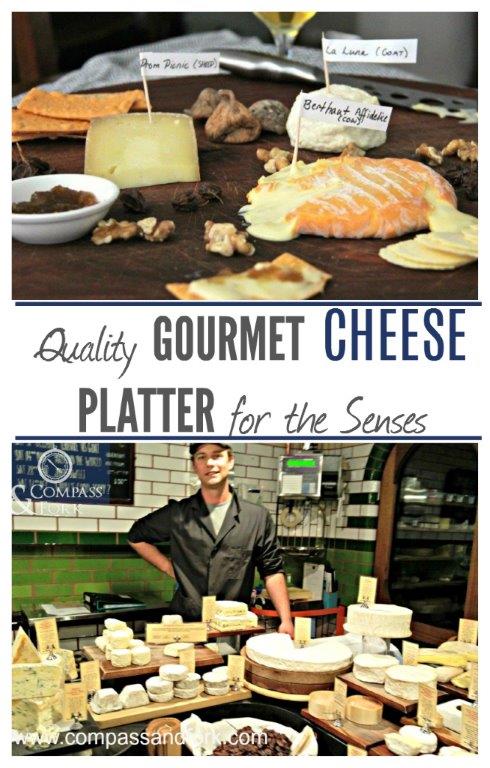
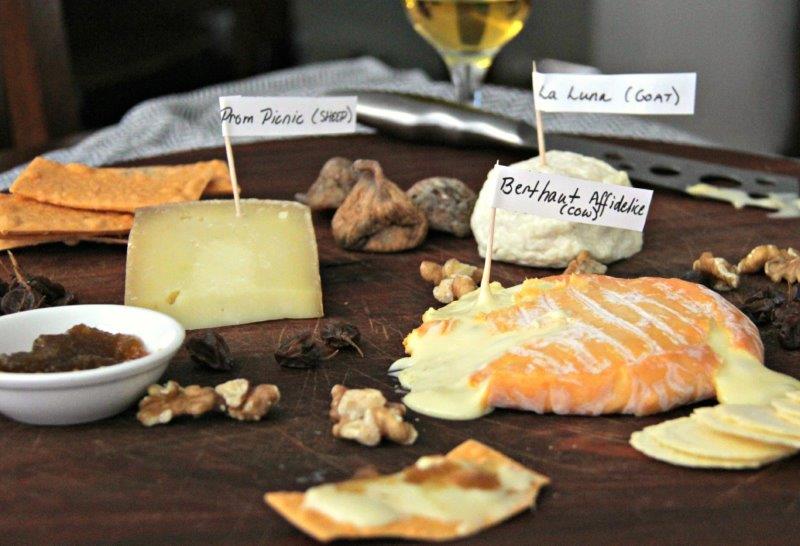
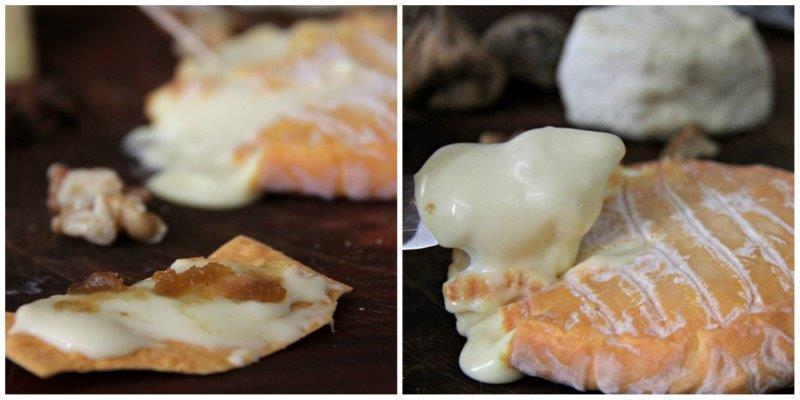
Michelle - The Foodie World
Great post and love the wine recommendations. Makes me want to head out to the market, pronto.
Editor
It is our favorite place to buy cheeses. And much easier to speak to someone about the products you purchase.
Nicole - Champagne and Chips
Wow, you do get around. Melbourne is my part of the world.
This is a fab guide. Although I did laugh at the bit about Australians having cheese after dinner. Except at a restaurant when people without a sweet tooth might have cheese instead of dessert, as a culture we are all about lashings of cheese as an appetiser. Certainly in a casual setting. You do make us sound a bit more elegant and European though 😉
Editor
Agh well Nicole. We are also from Melbourne and I recall when I first started going to restaurants it was everywhere as an after main meal option. But you are right we more often than not eat it as an appetizer now or at lunch (even better). Thanks for your comment.
Louise@WillungaWino
Great post! We have some stunning cheese here in South Australia too, including Australia’s first “raw milk” cheeses, the Emme and the King Saul – a blue from Udder Delights (great name huh?).
One of the most fascinating things for me is how cheese changes the flavour & texture of wine, and vice versa. Bubbles stand up best to cheese for me, or like you suggested, fortifieds.
Thanks for linking up your post on #WINENOT the Wine Blog Post Sharing Party!
Cheers,
Louise
Editor
OK I have seen udder delights somewhere in my travels and yes what a great name. The bottom line is that cheese is pretty good throughout Australia. I grew up drinking port and then muscat with cheese. And then we grew up and started drinking sticky whites. I also like red wine with cheese and yes bubbles particularly if served as an appetizer. So many choices. Thanks for your comment.
Teresa
I wish I could try some of the Australian and Victorian cheeses! I love tasting new cheeses. But for me cheese platter can only be an appetizer not a dessert – what can I say I’m sugar addicted 🙂
Editor
Teresa, I am addicted to cheese (I can resist sugar!) There are so many great cheeses around the world. If you make it to Australia do look out for them!
Jessica {Swanky Recipes}
For the past few months, I’ve been buying a new cheese that I haven’t tried each week. I love cheese and I also want to explore more of it and introduce it into cooking. Really enjoyed your post! Right now, I’m obsessed with white cheddar and aged gruyere.
Editor
Jessica, I like the idea of a new cheese each week! I got a fantastic aged gruyere from the Richmond Hill Cheese Shop the other day! Expensive but just beautiful!
Anne Murphy
Great general guide for a cheese platter!
I’ve never had the chance to try Australian cheese, but it sounds as if they are making some fascinating ones! (I do eat some local ones here in New York – love the variety…)
Editor
Thanks for your comment Anne. Cheese platters are so easy. We have enjoyed cheese in New York also, we have a friend in Brooklyn we sometimes visit.
Cindy (Vegetarian Mamma)
My husband and I always try to do something fun for ourselves on NYE. Now I have the perfect idea. Thank you for sharing how to construct a cheese plate for the sense! I know we will enjoy this!
Editor
Thanks Cindy, appreciate your comment. The best part of the cheese platter is deciding on the cheeses. Nice if you can find a delicatessen or cheese room that will give you a taste!